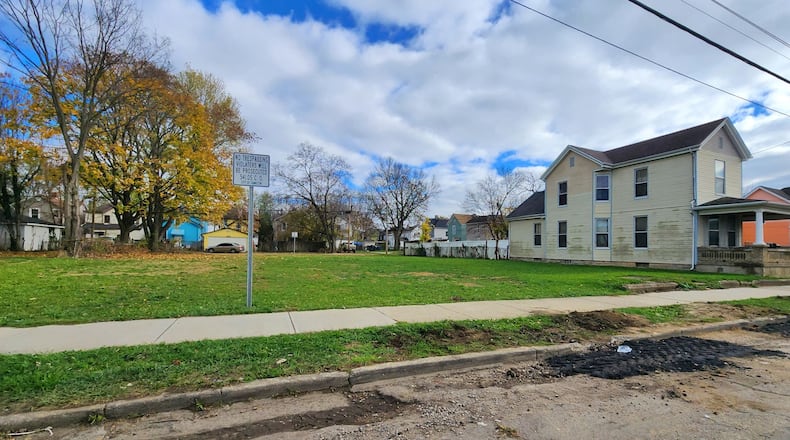City Manager Craig Bucheit announced the initiative at his first State of the City address last month. The first public step is to construct new houses in Jefferson, and while some groundwork has been laid, this program still needs city council’s approval to formalize an agreement with Neighborhood Housing Services of Hamilton to build new homes for those low-to-moderate income residents.
“One of our key strategic priorities is being neighborhood-focused while continuing to drive development and maintain the momentum of revitalization,” he said. “As I pointed out in this year’s State of the City address, a significant challenge we face as a community is a shortage of housing units at all price points and in every neighborhood. Our traditional neighborhoods have been hardest hit by the loss of these homes and have been left too far behind for too long.”
Bucheit said the focus for this housing program will be in traditional neighborhoods, like Jefferson, because “you have to start somewhere.” Of the nearly 1,000 vacant lots citywide where single-family homes once stood, more than 300 are in Jefferson. This will reconnect and reactivate these properties, making them productive again by having a taxpayer owning a home on the property.
“The loss of these homes, largely in our traditional neighborhoods, has had a major impact on our community. It has created significant pressure on our housing market, driving up costs and rents, while thousands of students are missing from our schools, and thousands of people are absent from our workforce,” he said.
Not only is Jefferson near downtown, it’s located between two major state routes, Ohio 4 and Ohio 127, and Bucheit said is “closely tied to our urban core revitalization efforts.” It’s also supported by existing institutions and amenities, like the Boys & Girls Clubs of Hamilton, Jefferson Park and Living Water Ministries, and plenty of nearby employers, like JN Linrose, Matandy Steel, Meyer Brothers and Sons, and Third Eye Brewing. The city has also invested with the new Justice Center that will incorporate the police department and municipal court.
Growth is also limited in traditional neighborhoods, as there are very few greenspace areas in the city where new developments can be constructed. But building new homes in established areas does have the advantage of existing infrastructure ― roads, sidewalks, public utilities.
“We’ve got an amazing renaissance in our city, and the downtown core was the right place to start,” he said.” We needed to create amenities, we needed to build momentum.”
Hamilton’s economy has changed over the decades, from its industrial roots with makers of paper, cloth, safes, and beer, to incorporate advanced manufacturing, hospitality, banking and health care. Bucheit said the city needs to rebuild working-class neighborhoods like Jefferson and the North End “to support this new economy with a workforce.”
Credit: Nick Graham
Credit: Nick Graham
The first homes on city-owned lots in Jefferson will be between 644 and 654 East Avenue, just north of Hanover Street.
Liz Hayden, Hamilton’s executive director of Neighborhood Services, said, “It’ll be nice to see new houses constructed” in these neighborhoods, and while she would like to see them built “as soon as possible,” there are many steps they need to follow.
The first step will be formalizing council’s consent, which is anticipated on Dec. 4 with a resolution agreeing to a memorandum of agreement with Neighborhood Housing Services.
NHS Executive Director Lorie DiStaola said while her agency and the city have partnered on other things in the past ― such as emergency preparedness program and down payment assistance ― she believes this partnership is unique. While there are municipalities that have done something like this, there are plenty that do not prioritize this type of affordable housing project.
Credit: Provided
Credit: Provided
“It’s completely unique, and I completely commend and applaud the city of Hamilton,” said DiStaola, who added Hamilton leaders are not just making it a priority, but saying “‘We’re going to make this a reality.’ They’re committed. This is not just a wish list kind of project.”
She also agreed starting in Jefferson was the right decision, saying, “There’s a lot of potential there.”
“Revitalization and new housing kind of go hand-in-hand. It enhances community well-being, economic growth,” she said. “Housing is a huge issue right now.”
Homeownership trends
The rate of homeownership in Ohio is on the decline; for the first time, the state’s rate is lower than the national average, according to the Ohio Housing Finance Authority. The median prices for an Ohio home is $174,000 and it’s the second-highest year on record. In 2021, the highest year for median home prices, the median home price was 2.6 times the median household income ― the largest price-to-income ratio since 2005, which made homeownership unaffordable. Today, the median home price is $172,783, according to OHFA.
Nationally, home prices have increased nearly 5% year over year in July 2024, according to the S&P CoreLogic Case-Shiller Home Price Index as reported by Business Insider.
Mayor Pat Moeller said affordable housing is important, and something like this is how to start. However, he said he hopes “we can create some deed restrictions to make sure these first few are truly homeownership.”
There will be some security built into the program to ensure homebuyers aren’t leasing or renting the homes, as the goal is to make low- to moderate-income residents homeowners. There could be stipulations included in the contract where they must live in the home for a specified amount of time, likely at least five years, and the home must be owner-occupied, which means they cannot lease or rent the home.
Credit: Provided
Credit: Provided
There are three artist’s renderings for what the homes could look like, which DiStaola said will keep within the characteristics of the neighborhood, and plans and renderings will be updated as structures go through the building and zoning process. Depending on weather and contractor schedules, DiStaola said at the earliest, a groundbreaking could happen as early as spring.
The program would also be for those currently living in the targeted neighborhood, Hayden said, saying the memorandum of agreement “is a beginning step” for the commitment. She said there still needs to be prep work, such as architectural drawings and engineering, before determining a timeline and construction costs. The price of the homes would be calculated when costs are calculated.
Councilman Michael Ryan call this project “a good start to something new in Hamilton,” especially with affordable housing, an issue the city hasn’t addressed in the past couple of years. “It’s going to start something special. It’s giving us an opportunity to finally redevelop our hard hit neighborhoods and to give them a start.”
Bucheit said though Jefferson is where Hamilton is starting, “we plan to take the lessons we learn, the strategies we develop, and apply them across the city and in every neighborhood. Our neighborhood-focused approach and our commitment to rebuild our neighborhoods is the foundation that’s necessary to support our continued revitalization and sustain our success in the decades ahead.”
About the Author



